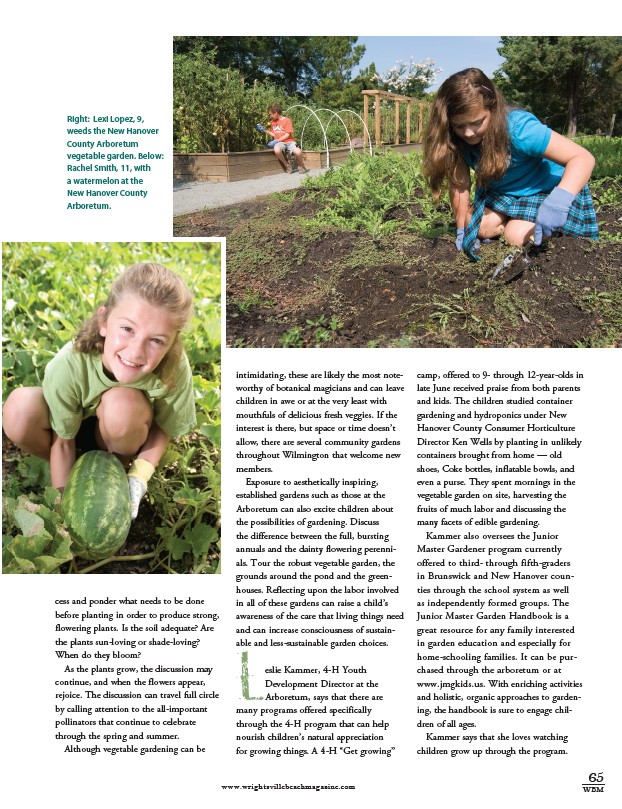
65
cess and ponder what needs to be done
before planting in order to produce strong,
flowering plants. Is the soil adequate? Are
the plants sun-loving or shade-loving?
When do they bloom?
As the plants grow, the discussion may
continue, and when the flowers appear,
rejoice. The discussion can travel full circle
by calling attention to the all-important
pollinators that continue to celebrate
through the spring and summer.
Although vegetable gardening can be
intimidating, these are likely the most noteworthy
of botanical magicians and can leave
children in awe or at the very least with
mouthfuls of delicious fresh veggies. If the
interest is there, but space or time doesn’t
allow, there are several community gardens
throughout Wilmington that welcome new
members.
Exposure to aesthetically inspiring,
established gardens such as those at the
Arboretum can also excite children about
the possibilities of gardening. Discuss
the difference between the full, bursting
annuals and the dainty flowering perennials.
Tour the robust vegetable garden, the
grounds around the pond and the greenhouses.
Reflecting upon the labor involved
in all of these gardens can raise a child’s
awareness of the care that living things need
and can increase consciousness of sustainable
L-and less-sustainable garden choices. eslie Kammer, 4-H Youth
Development Director at the
Arboretum, says that there are
many programs offered specifically
through the 4-H program that can help
nourish children’s natural appreciation
for growing things. A 4-H “Get growing”
camp, offered to 9- through 12-year-olds in
late June received praise from both parents
and kids. The children studied container
gardening and hydroponics under New
Hanover County Consumer Horticulture
Director Ken Wells by planting in unlikely
containers brought from home — old
shoes, Coke bottles, inflatable bowls, and
even a purse. They spent mornings in the
vegetable garden on site, harvesting the
fruits of much labor and discussing the
many facets of edible gardening.
Kammer also oversees the Junior
Master Gardener program currently
offered to third- through fifth-graders
in Brunswick and New Hanover counties
through the school system as well
as independently formed groups. The
Junior Master Garden Handbook is a
great resource for any family interested
in garden education and especially for
home-schooling families. It can be purchased
through the arboretum or at
www.jmgkids.us. With enriching activities
and holistic, organic approaches to gardening,
the handbook is sure to engage children
of all ages.
Kammer says that she loves watching
children grow up through the program.
www.wrightsvillebeachmagazine.com WBM
Right: Lexi Lopez, 9,
weeds the New Hanover
County Arboretum
vegetable garden. Below:
Rachel Smith, 11, with
a watermelon at the
New Hanover County
Arboretum.